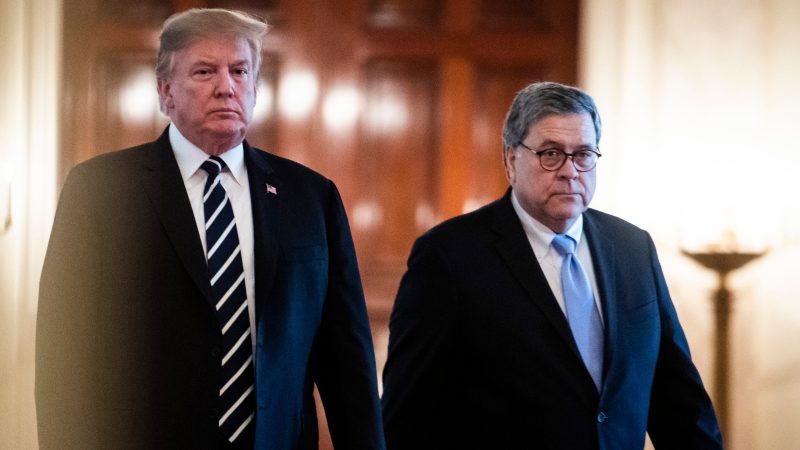Rupert Murdoch’s media empire is in legal jeopardy thanks to its decision to promote President Donald Trump’s false claims of a stolen 2020 presidential election.
On Thursday, Trump’s former attorney general William P. Barr took to one of Murdoch’s outlets to support another.
Barr, writing in the Wall Street Journal, defended Fox News in the face of a defamation lawsuit brought by Dominion Voting Systems. It’s perhaps unsurprising from a guy with a demonstrated penchant for tailoring his legal analysis to fit his allies’ purposes. Like Fox, he argues that an adverse outcome could damage media outlets beyond Fox News. (For a counterpoint on that, see here.)
But for our purposes, we’ll focus on Barr’s legal case: that Fox’s coverage of the false claim that Dominion rigged the 2020 election doesn’t amount to defamation. And while that’s very much an open question, there are some holes in the arguments as Barr lays them out.
Echoing Fox, Barr argues that the network was merely covering claims from newsworthy individuals, rather than endorsing them.
“As the record shows, the hosts presented the claims as unproven allegations and didn’t say they were true,” Barr asserts. “As long as claims are presented only as allegations and not asserted to be true, legal responsibility for any defamatory content rests with those making the allegations, not the news outlet.”
There is indeed a fine line between airing a false claim and actually endorsing it. As I’ve noted, Fox hosts didn’t go as far as guests like pro-Trump lawyers Sidney Powell and Rudy Giuliani. But there were certainly times when they went beyond treating them as “unproven allegations” and even seemingly endorsed them.
At one point, then-Fox Business Network host Lou Dobbs responded to Powell’s claims about Dominion by citing “what is apparently a broadly coordinated effort to actually bring down this president.” In the same interview, he cited Powell’s claims of a “cyber Pearl Harbor” involving Dominion and added, “We’re talking about very large — a very large foreign intrusion and interference in the election of 2020.” He previewed another Powell interview by saying, “She will be providing more details on how Dominion vote machines and Smartmatic software were used to help Joe Biden.”
Dobbs also at one point retweeted a Giuliani tweet about Dominion, while adding, “Read all about Dominion and Smartmatic voting companies and you’ll soon understand how pervasive this Democrat electoral fraud is, and why there’s no way in the world the 2020 Presidential election was either free or fair.”
Dobbs’s show, which was the highest-rated program on Fox Business, was canceled in February 2021 shortly after another similar defamation suit was filed.
Fellow Fox host Maria Bartiromo also said, in the context of such claims: “Who is to stop this from happening again? I mean, if you’ve Democrats in charge — from here on out they’re in charge of the machines, you’ll never see a Republican in the White House again.”
But even in the cases in which Fox merely allowed such lies to be spread on its airwaves, without directly endorsing them, there could be liability. That’s because, legal experts note, such protections extend only so far. Fox gets into trouble if it can be proved that it allowed such claims to be aired while knowing they were false or harboring serious doubts and aired them for its own gain.
An appeals court ruled in 1977 that “a publisher who in fact espouses or concurs in the charges made by others, or who deliberately distorts these statements to launch a personal attack of his own on a public figure, cannot rely on a privilege of neutral reportage.”
A judge in the Dominion case also previously rejected Fox’s motion to dismiss the case on these grounds, saying, “Fox’s reporting must have been neutral, not ‘a personal attack’ on Dominion, to succeed on this defense. Dominion’s well-pleaded allegations, however, support the reasonable inference that Fox’s reporting was not accurate or dispassionate.”
Beyond that, Barr argues that Fox’s speech is protected because its hosts were merely expressing opinions.
“Second, defamation applies only to false statements of fact, not statements of opinion,” he writes. “Thus, it isn’t defamatory for a journalist to provide commentary — stating an opinion about an allegation — as long as he doesn’t assert that the defamatory aspects of the allegations are true.”
But some experts say an opinion need not necessarily “assert” that the underlying claims are true, so much as treat them as such.
“To the extent that the opinion is predicated on defamatory ‘facts’ that are false, the statement as a whole can be considered defamatory,” said Catherine Ross, an expert on defamation law at George Washington University law school. “Reasonable, responsible speakers may differ as to the opinion they reach from the same facts — so yes, opinion is fully protected. But factual falsehood like ‘stolen-election allegations are serious’ when the speaker knows the allegations are baseless is not.”
Added longtime media lawyer Lee Levine: “The legally relevant question to which [Barr] appears to be speaking is whether, with respect to each challenged broadcast, a reasonable viewer would understand Fox to be endorsing the accuracy of what a guest said. … Whether the host’s statement, taken in isolation, could be reasonably construed as his or her opinion, though of some relevance, doesn’t control the relevant legal analysis.”
The question from there is whether Dominion can prove the right people knew better — Dominion has provided extensive evidence that high-ranking people at Fox did, if not necessarily the specific hosts themselves — and that Fox disregarded evidence disproving the underlying claims.
To that point, there’s the question of whether it matters that those other people knew better.
Barr argues that it does not, saying that “none of the evidence marshaled by Dominion establishes that any of those hosts had grave doubts about the allegations and hence acted with ‘actual malice.’ Instead, Dominion’s evidence relates to possible doubts held by other Fox employees, not the hosts, and is therefore irrelevant.”
But courts have in the past ruled that those others’ doubts can be relevant. Dominion has cited a 2002 appeals-court case that also involved a media company allegedly misleading its audience for financial gain. The court ruled that the “actual malice” standard for defamation could be established even if those who raised concerns weren’t “the final decision-makers as to the content.” It did cite the final decision-makers’ awareness of the concerns.
And then there’s the question of whether Dominion can prove that Fox willingly avoided the truth about something that many in its camp clearly knew was baseless and even false.
Levine recently told The Washington Post that, after Dominion shared information with Fox debunking such claims, “Fox’s alleged failure to do anything further with respect to putting Powell and Giuliani on the air amounts to what law calls a deliberate avoidance of the truth.”
And indeed, that’s what Dominion’s lawsuit is likely to rest on — the idea that too many people knew better for it to have been an accident that these claims continued to be aired.








